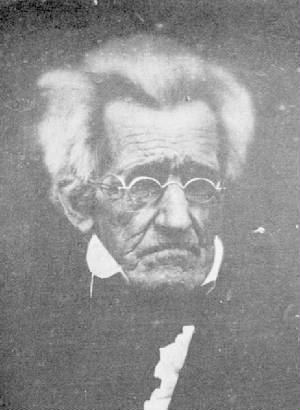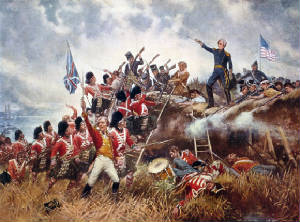|
President Jackson : Old Hickory
(1767 - 1845)
| Andrew Jackson : Old Hickory |

|
| President Andrew Jackson |
Andrew Jackson ("Old Hickory"),
a Representative and a Senator from Tennessee and 7th President of the United States; born on March 15, 1767, in the
Waxhaw Settlement in South Carolina; attended an old-field school; though just a boy, participated in the battle of Hanging
Rock during the American Revolution, captured by the British and imprisoned; worked for a period in a saddler’s
shop and afterward taught school; studied law in Salisbury, N.C.; admitted to the bar in 1787; moved to Jonesboro (now
Tennessee) in 1788 and commenced practice; appointed solicitor of the western district of North Carolina, comprising what
is now the State of Tennessee, in 1788; held the same position in the territorial government of Tennessee after 1791; delegate
to the convention to frame a constitution for the new State in 1796; upon the admission of Tennessee as a State into
the Union was elected to the Fourth and Fifth Congresses and served from December 5, 1796, until his resignation in September
1797; elected as a Democratic Republican in September 1797 to the United States Senate for the term that had commenced March
4, 1797, and served from September 26, 1797, until his resignation in April 1798; judge of the State Supreme Court of Tennessee
1798-1804; engaged in planting and in mercantile pursuits; served in the Creek War of 1813 as commander of Tennessee forces;
his victory in the Creek War brought him a commission as major general in the United States Army in May 1814; led his army
to victory over the British in the Battle of New Orleans in January 1815; received the thanks of Congress and a gold medal
by resolution of February 27, 1815; commanded an expedition which captured Florida in 1817; served as Governor of the new
territory in 1821; again elected to the United States Senate and served from March 4, 1823, to October 14, 1825 (when he resigned);
chairman, Committee on Military Affairs (Eighteenth Congress); unsuccessful candidate for President in 1824; elected as a
Democrat as President of the United States in 1828; reelected in 1832 and served from March 4, 1829, to March 3, 1837; retired
to his country home, the ‘Hermitage,’ near Nashville, Tenn., where he died June 8, 1845; interment in the garden
on his estate.
| President Andrew Jackson |

|
| Battle of New Orleans |
Bibliography
American National Biography; Dictionary of American Biography; Remini,
Robert. Andrew Jackson and the Course of American Empire, 1767-1821. New York: Harper & Row, 1977; Jackson, Andrew.
The Papers of Andrew Jackson. Edited by Sam B. Smith, Harriet Chappell Owsley, Harold D. Moser, Sharon Macpherson,
David R. Hoth, John H. Reinbold, et al. 4 vols. to date. Knoxville: University of Tennessee Press, 1980.
|

